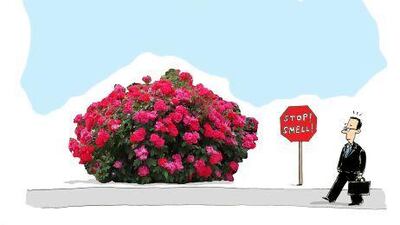I've always been a late developer. I just recently discovered that, when swimming the front crawl, you need to give your arms the chance to recover when they're out of the water, and not (as I do) keep them tense with muscles firing.
Wow. What a revelation. Not just in terms of improving my, obviously bad, swimming technique, but also a great metaphor for life.
It goes like this:
We have a finite amount of energy each day. We should use it wisely and effectively to serve our goals.
So how do we determine where we need to focus our effort?
Well, the first step, I believe, is to figure out what's really important to us and to articulate and set out what we're aiming for. These goals are likely to change over time, and need to be revisited every so often.
Have you truly done this? Judging by later-life epiphanies and things that came up in a book a nurse wrote about her conversations with terminally ill patients over the course of several years, it would be safe to say that most people are functionaries, not thinking through what's truly important.
The patients whose stories are told in The Top Five Regrets of the Dyinghad all been given three to 12 weeks to live, so they had nothing to hide. Their minds were focused on what life is really about. The theme revolved around living a life true to yourself, and not one that others expected of you. These dying people knew that they had not fulfilled their dreams, and that what they did, or did not do, during their lives had brought them to this point.
And what we do with our money, every day of our life, also leads us to this point. Having money equals having choice. But also recognising the life-cost of earning more money is crucial. What I mean by this is that if your goal is to help children deal with the trauma of war and displacement, then your monetary needs are markedly different from someone who wants to cruise around the world and enjoy the spoils that hard cash can bring.
A friend of mine upped sticks from Dubai and is now working with children in Uganda. Many people in the UAE are aspiring to a very different life.
There's no wrong or right way to live. It's about thinking through what we want for ourselves, and thinking long term.
One focus of our financial planning should be to ensure that we are not a burden on our families later on. How many of us have health insurance in place? Pensions?
Perhaps the better question would be: how many of us don't have these things? We all need to earn (at least everyone I know needs to), and what we do with our earnings either brings our dreams closer or not. You see, the big "ah-ha" moment is here: it's not about what you earn, it's about what you do with whatever you earn.
And this brings us to the second regret of the dying: having spent too much time working.
Just this morning a female friend spoke of her partner being so focused on work that he doesn't communicate with her during the day. It's as though she doesn't exist. And yes, she too is a working person, but she puts a higher value on relationships and a more balanced outlook to life.
I know of many women who are going through divorces, their children having grown, because they simply have no relationship with their husbands.
Every man included in the book the nurse wrote deeply regretted not having more fully experienced his children growing up or his partner's companionship. Of course, women also have these issues to contend with; the patients were mostly of a generation in which the men were the main breadwinners.
The point here is, again, figuring out what's more important. Time ticks in one direction only, and there are things you can never go back to. So is earning more money or your high-profile job really the right thing for you, your family, your life situation? The answer could be yes or no; think it through.
The other three regrets of the dying revolved around mental well-being: having the courage to express feelings, staying in touch with friends, and allowing ourselves to be happier. I'd like to delve into this, and how it affects our pocket another time.
So how about joining me in living a deliberate life? One in which we know where we're headed, what we really want to be doing, and who we want to be doing it with, as opposed to becoming a human robot where you cross off the days, and are ultimately paralysed by how you choose to spend your time, and money.
Just imagine, really do imagine, you were one of those patients, and had been told you had three to 12 weeks to live. Are you headed in the right direction? How about dealing with regrets right now, while we're living, instead of when our time is up?
Nima Abu Wardeh is the founder of the personal finance website www.cashy.me. You can contact her at nima@cashy.me

On the Money: Here and now, decide on what really matters
On the money: I've always been a late developer. I just recently discovered that, when swimming the front crawl, you need to give your arms the chance to recover when they're out of the water, and not (as I do) keep them tense with muscles firing.
Most popular today
